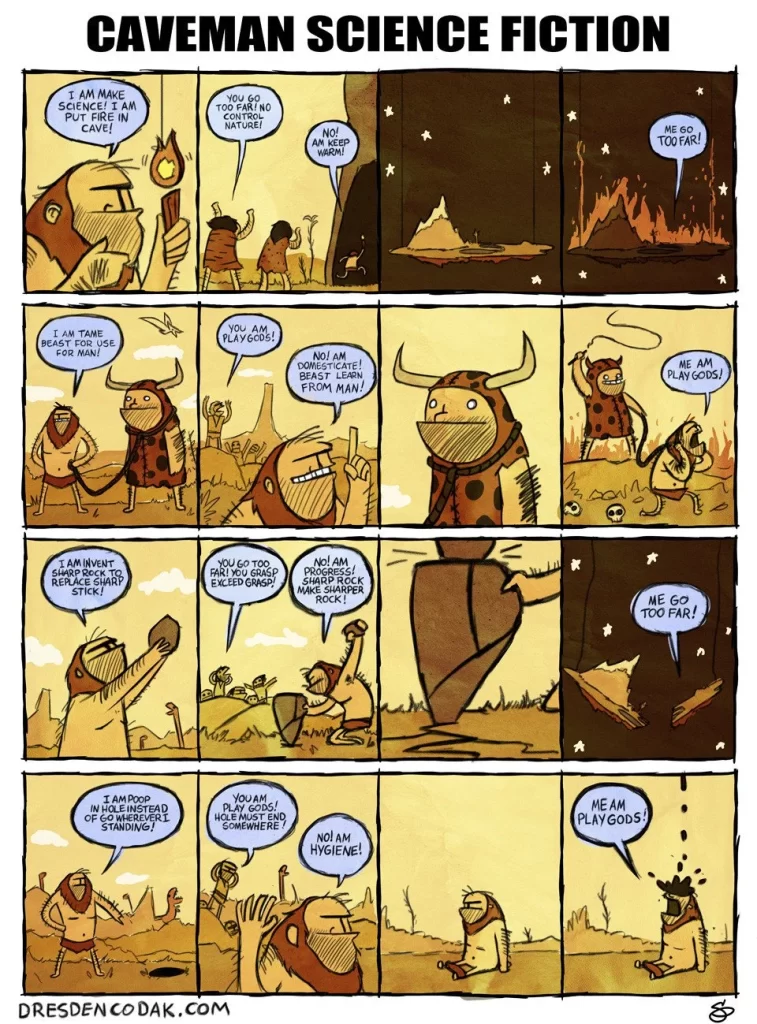I was first introduced to the idea of anti-intellectualism in college by one of my many outstanding professors. I forget now which book we were dissecting, but he said to me: “You’ll notice, constantly, that the antagonists are smart and the heroes are morons.”
I thought about that for a long, long while.
The answer is that authors do this is because people who are “too smart” are dangerous. You don’t know what they’re capable of. Go back far enough and we get into things like spelling, where knowing how to read and write is occult knowledge that should be reserved for priests. Spelling words is powerful magic that can’t be trusted to just anyone. Hence the demonization of promethean figures who make printing presses or invent simple home telescopes or—to take a current-day view—write books or teach kids how to think or even put books in front of kids at all.
Knowledge must be restricted and feared. Stay out of God’s playground, because if you don’t, Hell awaits.

This theme has always been present in the Jurassic series of films. Meddling scientists splicing genes willy-nilly with no regard to what the consequences will be. And sure enough, it all ends in hellfire and destruction. As enjoyable as these movies were, it always itched that people with know-how were usually the worst of the bunch. Even the programmer. Remember Dennis Nedry (Wayne Knight)? The character is brilliant but amoral. Malcolm (Goldblum) isn’t far off, although at least he gets to grow throughout the series.
But There’s Another Wizard
Yet…behind these (I’ll call them) minor villains is something more insidious. A lurker in the shadows, behind the scenes, pulling the strings. And I think this, too, has been a theme in the series all along, although it took a while to address it directly.
Hint: it’s capitalism.
I’d say “billionaires,” because if you perhaps thought that Dr. Dodgson (Scott) resembled a certain cultural archetype, I think you’d be absolutely spot-on. That’s a thematic concern: the super-concentration of wealth in these films warps ethics. As it does. But Dominion, especially, goes much, much further than that. There are repeated, whole scenes dedicated to showing just how exploitative everyone gets. The fighting pits, the butcher shops, the black markets. The billionaires are a problem, yes. We’ve got to deal with that. The other problem, the mirror Dominion holds up, is us.
Or I should say us as we are in a capitalist framework. The scientists, engineers, and philosophers aren’t themselves bad by nature; they’re bad in a trellis whose structure is vacant of ethical concerns. This social definition that puts smart people to use without informing them of the slightest humanity. They’re a manipulated tool.
Look at the trained raptor killers. Conditioned beyond reason to destroy anything their handler shines a laser on. Who’s the villain here? Is it the raptors, the handler, or the system that makes training hunter-killers (and handlers) lucrative?
Early in the film, Malcolm is shown lecturing a classroom. He ends his sermon by saying that to go forward in any meaningfully non-destructive way we’ll need to transform human consciousness. I almost didn’t like this line when I watched it. Now I think it’s probably the most pivotal statement.
The aptly named DeWanda Wise abandons her life in the underworld to help. Maisie Lockwood’s coming of age…well, comes of age. She transforms. Even Dr. Wu finds a new conscience.
Playing in the Playground
And that’s the bookend to Malcolm’s remarks. Wu successfully modifying the monstrous locust swarms to avert an ecological meltdown, with tech that had been in his hands the entire time.
He already had the tools. The problem wasn’t the science. The problem was that he simply didn’t know how to use it.